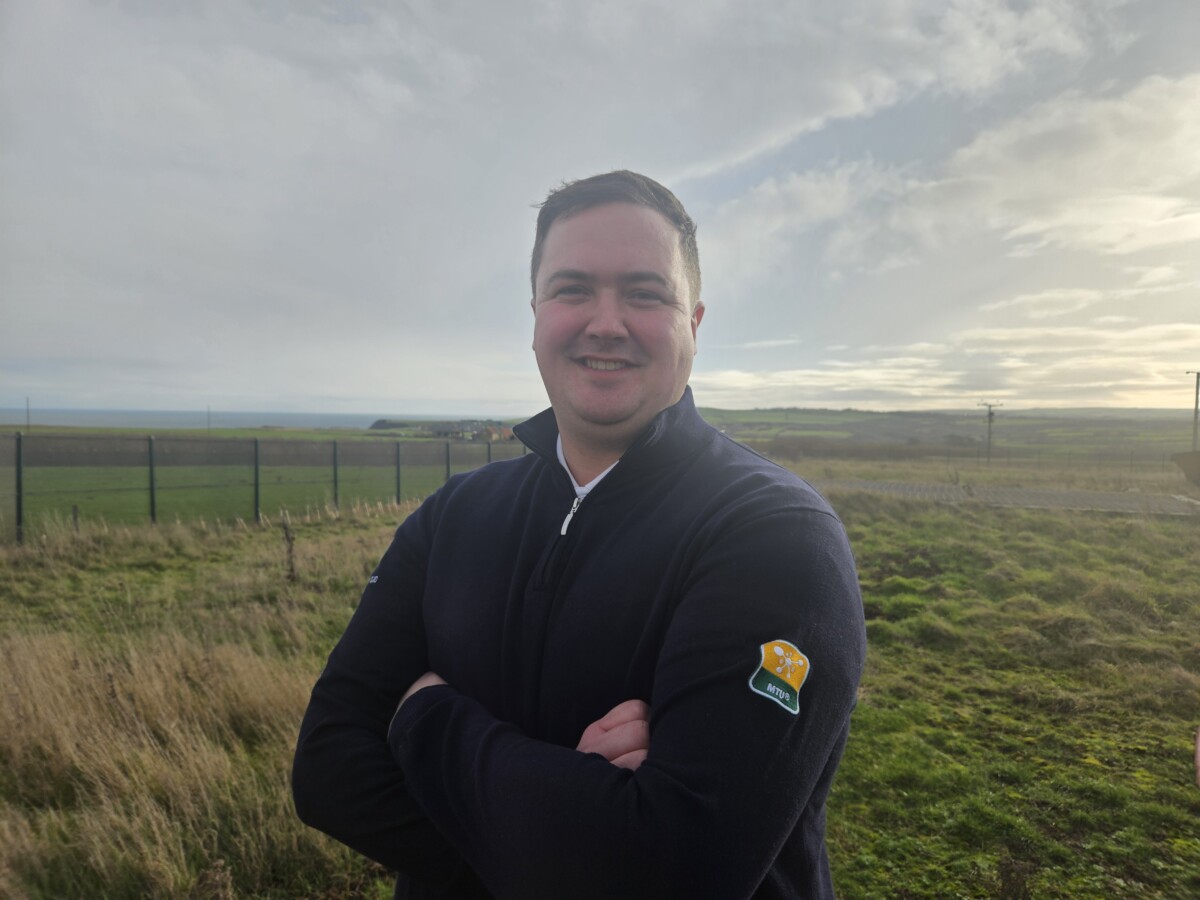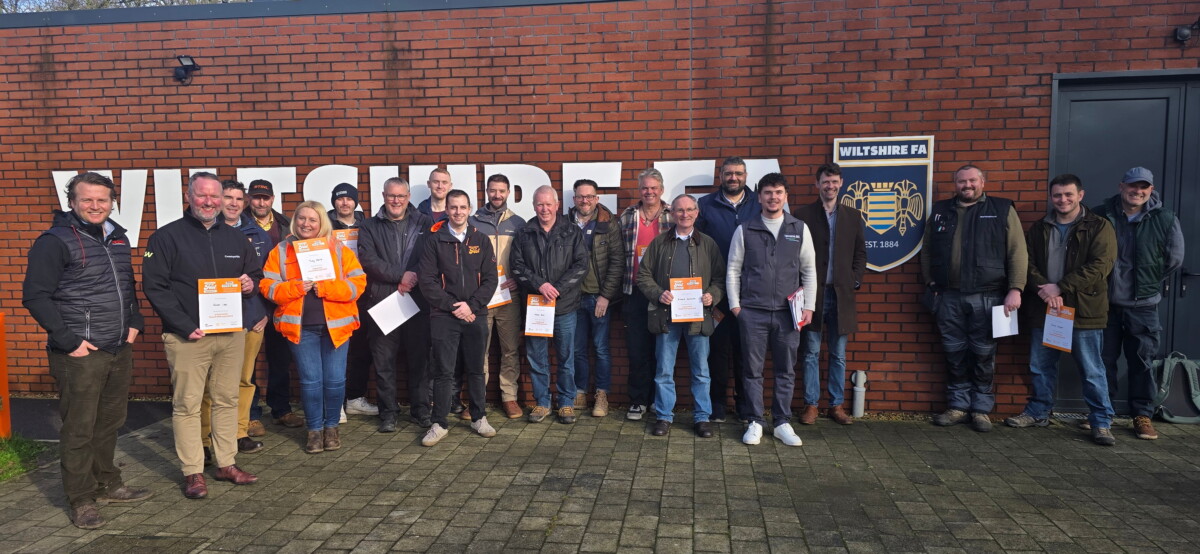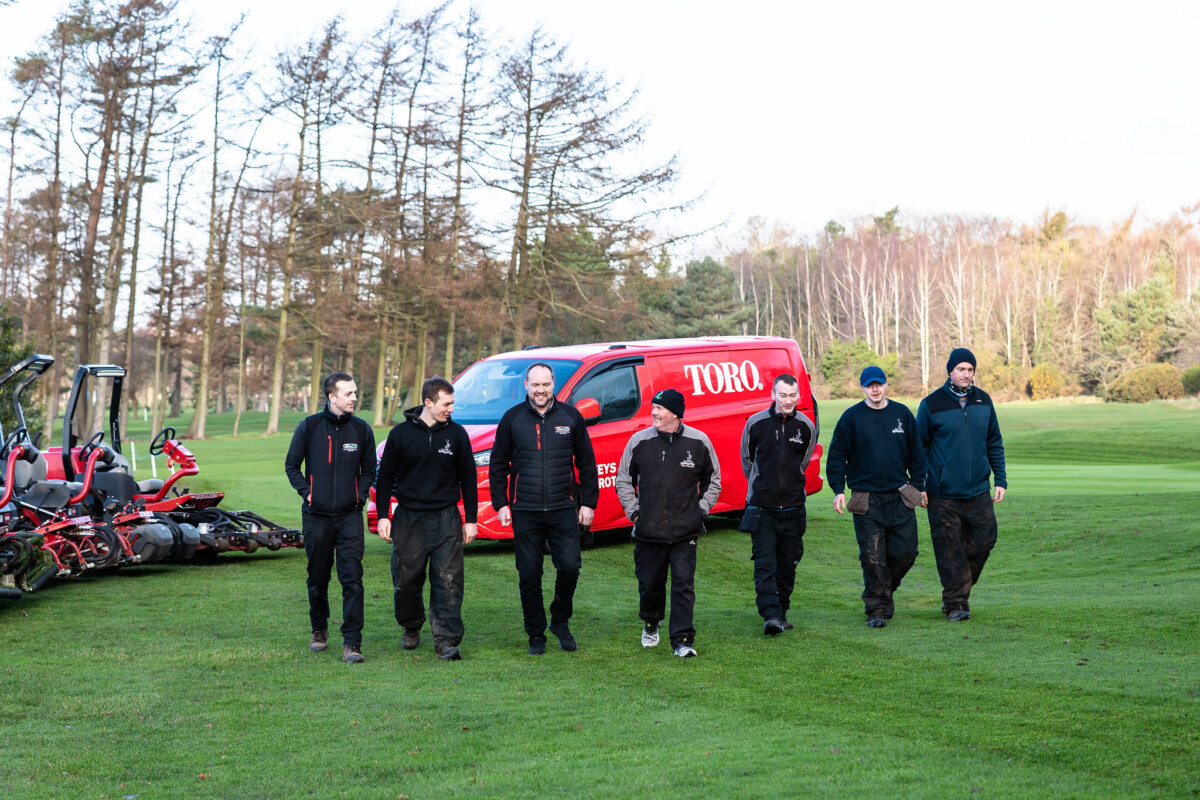Look at me now!: Scott MacCallum caught up with Jordan Fairweather and learned just how far greenkeeping has taken him.
Jordan Fairweather had been joined by his parents for a meeting with the school’s careers’ advisor. Always keen to keep busy, he had been splitting his time between two holiday jobs, one at his father’s car dealership and the other divotting fairways at Letham Grange Golf Club, near Arbroath.

Look at me now!
When it came to the inevitable question of “What do you want to do?”, it was as much a surprise to his mum and dad as it was to the careers’ advisor when he replied, “I’d like to go to Elmwood College and give greenkeeping a go”.
It was perhaps the fact that his parents were so dumbstruck by the answer that it was neither of them who spoke next.
“’That’s an absolutely silly idea. It will never give you a career, never give you enough money and you’ll be spending the rest of your life cutting grass, You should go into the family business’,” was the response from the person whose sole role was advising young people on the path to career fulfilment.
That was back in the mid ‘90s and Jordan was recounting the story from Dubai, where he is in charge of operations at three prestigious golf clubs. He had just spent his weekend with his wife and two young children around the private pool in his housing complex. He has responsibility for around 115 staff and regularly meets with the clubs’ boards and stakeholders to discuss the current performance of the business along with further development opportunities.
Thinking back to that careers’ advisor, there is no feeling of having proved her wrong, just a degree of frustration that an excellent career option could so easily be ridiculed.
“I remember thinking I wonder what she would have said if I’d told her that I wanted to be a Formula One driver or a fighter pilot. She’d probably have said it was a good ambition to have. But what are the chances of making a life at that? Very slim!”
Being brought up on the east coast of Scotland – not far from Carnoustie – Jordan was very much in a golfing/ greenkeeping heartland, particularly with that other huge employer of greenkeepers, St Andrews Links, not too far away either. However, Jordan had a thirst for knowledge and to make the most of his career, and without a genuine affinity for links golf, he felt the urge to move away.
“I could see that I wasn’t going to learn any more where I was and so I took a long shot and gave up my full-time position and took a seasonal job at Loch Lomond Golf Club, working for Ken Siems and David Cole. I stayed there for seven and a half years.”
After just one year Ken, known for his ability to identify talent, was giving Jordan special projects to handle, including installing the SubAir system, one of the first at any UK golf club, irrigation-related projects and installing drainage pumps on what was and is regarded as a particularly wet site.
“What he saw in me? I’ve no idea. You’d have to ask him. Maybe it was a willingness to learn and try anything new. That was what I saw in Ken. He’d take a risk on anything.
The view was if you don’t try you are never going to improve. The funny thing is we still call each other now bouncing ideas of each other.
“Loch Lomond was certainly a stepping stone to learning and creativity, the management team were always trying to see how to take something to the next level.”
Certainly Loch Lomond was a great place to develop and Jordan was there when it was a regular host of the Barclay’s Scottish Open. He also grabbed the opportunity to study at Rutgers University in New Jersey.
“The Scottish Opens were always such a highlight on your calendar, but what really came through to me, at a place like Loch Lomond, was that there was so much more to the industry and so much you can do within the industry whether than be in a specialised area like irrigation or in construction or grow-in.”
When Ken moved on to a build a golf course in Dubai he asked Jordan if he wanted to go with him.

Look at me now!
“That was in 2008 and to say that I haven’t been home since, would be correct,” said Jordan, who clarified the statement by saying he’d probably been back to see his parents five or six times since, often coinciding with friends’ weddings or BTME at Harrogate.
Jordan was Construction Manager, working under Ken who was Project Manager, on the Golf City project in Dubai, which , ironically given its name, has now been replaced by a housing development. They were also responsible for grassing the racecourse which hosts the world’s richest race along with construction of the world-acclaimed Yas Links.
Dubai was not immune from the world recession in 2010 and construction work on such projects slowed, so Jordan made the decision which was to impact the rest of his life – he took on the task of completing construction and growing-in on a golf course in Bulgaria.
“The job had been advertised through St Andrews company, Braemar Golf, and I went to work there for a Bulgarian owner. It was then that I met my now wife. We were the first two employees of
the company and she was working on the marketing,” said Jordan, for whom the apartment they bought in Sofia, is still, and will always be, regarded as home – no matter where he and the family are living.
That Bulgarian project lasted two and a half years, after which he was off to Bahrain and the Royal Golf Club, where he not only managed the agronomy of the golf course, but also managed a landscaping company along with a golf cart sales and service division.
“The golf club was on an island and there were no local companies to supply fertilisers or flags and pins etc. The club was already the island’s biggest importer of seed and fertiliser and so a lot of the other managers at football pitches and racecourses used to ask us to bring supplies in for them.
“I stayed there for four years and by the time I left the landscaping company, which was run out of the golf maintenance department, was turning over $1 million, more than the F&B banqueting and Fitness departments.”
That was a great lesson for Jordan about the how various departments within a golf club can work towards the overall success of the club.
“Back in Scotland, each department tends to be run very separately – the greenkeeper is the greenkeeper, the steward is the steward and the F&B guy is the F&B guy. Very rarely is there any working together to achieve more for the club. Greenkeeping is usually the biggest cost centre for any golf club so the golf course manager or Superintendent should be in a position to manage more of the business and make the decisions. It was in Bahrain where I started to learn more about the business side of running, not just golf clubs, but businesses.”
Next stop was Malaysia.
“The Royal Golf Club was managed by Troon Golf and I’d been doing well and enjoying the job. Our daughter was born while we were there.
However, Troon asked if I wanted to go to Malaysia because they had a 72 hole Ernie Els design project.
They had already opened 18 holes and there was going to be another 18 holes on one side of a village, close to Singapore in Southern Malaysia, with another three loops of nine next door as well as a nine hole par-3. The first 18 holes was on the Island of Langkawi and required a flight every second Sunday.”
It was a Malaysian Government project aimed at growing tourism in the area and there were also a host to attractions being developed from water parks to Hard Rock Cafes and resort hotels.
“We were a 20-minute drive into Singapore and at weekends would go over as often as possible as Johor Bahru was not geared for ex-pat life.
“But that was probably the toughest role I’ve had, to be honest. There were lots of factors. We were an hour out of the main town in a small village, which presented logistical issues as the daily commute was 90 minutes each way.
There were also lots of different grass types and ages within the 45 holes and with the first being grassed three years earlier than the last, you can imagine trying to open 45 holes at the same time and achieve consistency. We also had 120 greenkeepers on the site and very few ex-pats with greenkeeping experience,” revealed Jordan.
“You’ve got a guy who’d just learned to write his name in English six months before and we were trying to train him to mix fertiliser and apply chemicals, the risks are high”
At the end of his two-year visa, Jordan decided that he didn’t want to apply for another, as that would have meant him working there for a further two years.
“Troon Golf said that they had a job that might suit me. It was in Prague, in the Czech Republic, which would be only an hour’s flight back to Bulgaria. It was to build a new course with architect Kyle Philips, who I’d already worked with back in Abu Dhabi.”

Look at me now!
So that was the next project and Jordan fell into the routine of flying to work on Monday morning, returning home on Thursday night and spending the three days at home working on the admin side of the job. All very well until Covid – and Jordan was stranded for 12 weeks in Prague away from the family!
It did bring to the fore one of the issues which wasn’t so commonplace in the middle east.
“You would automatically think that coming back to Europe would be easier than in Dubai or Malaysia but it’s not because English isn’t the first or even second language.
“Go to the Czech Republic with a daughter who speaks English and Bulgarian, which school do you put them into, because they all speak Czech . In Dubai, there are so many international schools and English is the first language.”
The Prague course was another to be marked down as a huge success, winning Europe’s Best New Course and the Czech Republic’s Best Course for a few years’ running.
“When I fi nished there, Troon Golf called and ask me if I wanted to go back to Dubai. They had a potential job for me and I could take the wife and kids (number two having since joined the family).
“One of the benefits of working in the Middle East is that the company pays for your kids’ schooling at an international school,” he said.
“So that is where you find me today. I’ve got three golf courses, all different styles – Arabian Ranches,Dubai Hills and The Montgomerie.
We are also constructing another 18 holes on Dubai South, close to a new airport which is being built.”
Asked to describe his day-to-day life you get a genuine feel for how far Jordan has come from the schoolboy replacing divots at Letham Grange back in Angus.
“I’m not the guy who has to be here at five o’clock in the morning. That’s not my role because I’m dealing with stakeholders across different departments which include weekly financial forecast and business review meetings and project development across a wider portfolio than golf. So I take the kids to school at 7.30 and two days a week I’ll come to my office to work on admin solely from a business point of view. For the other three days I’ll head to one property and for the first 90 minutes the Superintendent and I will drive the golf course and we’ll discuss plans for the week, how the current programs are going and share ideas,” said Jordan, adding that the children also go to a Bulgarian school every Sunday in Dubai to keep up with their home curriculum.
“Then we organise to meet every manager from that club from F&B, Security, Golf Operations, Sales and Marketing and we sit down together for half an hour for a coffee. Basically, the accountability of running three golf clubs is split between two of us, myself and a director of golf. A combined 167,000 rounds of golf a year and a membership base of 1,334 including social members,” said Jordan, who added that The Montgomerie alone does 62,000 rounds a year and every one is driven in a golf cart, so there are 290+ carts total, maintenance of which is also carried out by his mechanics.
“At the moment I’ve got 42 people at The Montgomerie, 26 at Arabian Ranches and 36 at Dubai Hills in agronomy plus engineering but I’m currently spending more time with the developers than on agronomy.
The owners are the biggest developers in Dubai and actually built the current tallest building in the world, the Burj Khalifa.”
With a wealth of experience at this fingertips, Jordan is in the position where he can predict how long it should take to get a golf course to the level it should be.
“I know, depending on the size of the property and the number of rounds that are being played how long it is going to take me to get the course to where an ownership or membership want it. It could be two years, it could be three. Once we have reached the level, in the past, that would be the time for me to get back into the construction side, but now I’m thinking of the family and unless a stand-out job comes along, I think we will be here for the foreseeable future.”
Having worked around the world, Jordan is well-placed to offer advice to anyone who harbours a desire to spread their wings.

Look at me now!
“I know of people who have decided to venture out of the UK and they’ve gone to France, or they’ve gone to Germany or Belgium and they’ve said it was too hard and returned home within six months.
“It’s not like volunteering at a golf tournament where everything from visas, transport, SIM cards, food and accommodation is laid on for you.
“Take Malaysia as an example. I would leave my wife every day in a city with very few ex-pats and she’d be an hour away from me. She had to fi nd the local doctors, the local post offi ce, the local car registration centre and it’s all in the local language.
“It can be tough, especially if you have a two year-old,” he said, adding that his admiration for his better half knows no bounds.
Wherever he has been he has tried to learn some of the local language.
“I always try and greet people in their own language, even if it is just to say ‘Good morning. Nice to meet you. I’m Jordan’. I then go on to ask if we can continue in English. They appreciate that you have made the effort.”
It would be fair to say that Jordan has come a long way since that careers’ meeting back in the mid-90s. His mum and dad have forgiven him and are regular visitors to not only spend time with their grandchildren but also to enjoy the delights of Dubai.
It would also be very fair to describe his career as exciting, rewarding, demanding and fulfilling.
You would not describe it as “silly”.
You can follow Jordan on social media on Twitter @golfagronomy and on Instagram, golf _agronomy


























